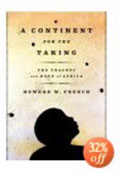Book
Review: A Continent for the Taking: The Tragedy and
Hope of Africa
 Howard
W. French, A
Continent for the Taking: The Tragedy and Hope of Africa (New
York: Alfred A. Knopf, 2004). $25.00
Howard
W. French, A
Continent for the Taking: The Tragedy and Hope of Africa (New
York: Alfred A. Knopf, 2004). $25.00
Reviewed
by Scott B. MacDonald
 Click
here to
purchase Howard W. French's book, "A
Continent for the Taking: The Tragedy and Hope
of Africa," directly from Amazon.com
Click
here to
purchase Howard W. French's book, "A
Continent for the Taking: The Tragedy and Hope
of Africa," directly from Amazon.com
Veteran
journalist Howard W. French has written an excellent
account of the trials and tribulations of modern Africa
(sub-Saharan Africa) as seen through the eyes of a sympathetic
observer during the 1990s. Although he has hope in the
title, the sense of tragedy is a far more overwhelming
sentiment that permeates the pages. Beginning when he
was a young man, making a trip with his brother through
Mali, the sense of hope erodes as the reader follows
French through the plagues of AIDS and Ebola, the massacres
in central Africa (Rwanda) and a plethora of failed political
and economic experiments in Congo (Brazzaville), the
Republic of the Congo (formerly Mobuto’s Zaire),
and Liberia. We are also left with a deep sense of frustration
and anger at the West, which in French’s eyes,
have consistently let Africa down. Indeed, he notes the
lack of support from the West when the possibility of
peace was melting away in Liberia during the 1990s: “Washington
and its European partners were preoccupied with the crisis
in Bosnia, though, and scarcely seemed concerned with
what diplomats thought of as a messy, two-bit African
affair.”
Three messages emerge from French’s opus. First and foremost, most
of the rest of the world really does not care overly about Africa. As he
notes: “Africa is the stage of mankind’s greatest tragedies,
and yet we remain largely inured to them, all blind to the deprivation
and suffering of one ninth of humanity.” Second, whatever interest
there is in Africa from the outside is largely driven by self-interest.
As he notes: “Africa interests us for its offshore oil reserves,
which are seen an alternative to supplies from an explosive and difficult-to-control
Middle East, or for rare minerals like coltran, which powers our cellular
phones and PlayStations.” In a sense, it is the ongoing brutal nature
of Africa’s encounter with the West that has caused the region’s
political and economic development to be so badly off-track in the early
21st century.
The third message is that despite all of the misfortune, Africa and the
Africans endure. The region has undergone horrible diseases that have decimated
local populations, suffered from corrupt and brutal governments, and been
a chessboard when needed for external powers, acting with little regard
for Africans.
It is to the last point there are some weaknesses in French’s book.
While the West decidedly has had a hand in creating Africa’s problems,
local players have also had a role in the dysfunctional nature of many
governments. Moreover, French chronicles some of the major disasters in
Africa, but he has little to say about South Africa which witnessed a peaceful
transfer of power from white rule to a more open parliamentary system,
the economic success of Mauritius and Botswana -- both with functioning
elective governments -- and Senegal’s peaceful development over the
past several decades. Yes, much is amiss in Africa, but it is not all tragedy – there
are a few spots of sunshine that indicate that Africans can manage their
own affairs without a resort to force.
Howard French has written an accessible book that is must reading for anyone
with an interest in Africa and current affairs.





